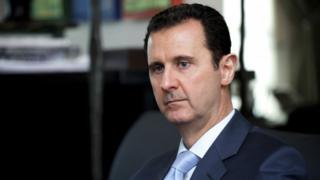Is the EU’s tough stance on Syria unravelling?
Reports that the Hungarian Government is planning to upgrade its diplomatic representation in Syria have sparked fears that the European Union’s tough stance towards Damascus may be slowly unravelling.
The fighting in Syria is not yet over. But there is little doubt that the Assad regime has survived. The outside world is having to slowly adjust to this new reality and it poses particular problems for those countries – in the Middle East and in the West – who actively championed Mr Assad’s opponents.
Very few EU countries kept up diplomatic ties with Syria during its long-running civil war. Only the Czech Republic kept its ambassador in Damascus. Hungary’s plans seem motivated in part by Prime Minister Viktor Orban’s populist approach; he has sought to portray himself as a defender of Christianity and Hungary’s main aid activities are directed towards Syria’s Christian community.
But just how significant is Hungary’s move?
Julien Barnes-Dacey, Director of the Middle East programme at the European Council on Foreign Relations, says that “in and of itself the Hungarian shift will not do much, but it points to the risk of a broader European unravelling which could undermine their ability to play any meaningful role going forward”. There would, he says, “be a particular question over the future of EU sanctions against Syria.”
It should be noted that the isolation of the Syrian regime has been greatly over-stated. Both during the conflict – and now in its aftermath – it could rely on strong political and practical assistance from both Russia and Iran. Many other countries – India and China for example – were loath to distance themselves from Damascus. Indeed Beijing furnished some support for Mr Assad at the UN.
With the rebel forces in Syria largely defeated and dispersed, it is no surprise that several Arab states have sought to restore or upgrade ties. Indeed the focus now – even for Saudi Arabia – is to try to engage with Syria in an effort to draw it away from Tehran’s orbit.
But the dilemma in the West is even more acute. Their policy has sought both to isolate the Assad regime and to force its demise through the application of economic sanctions and practical support for the opposition. The latter strategy failed spectacularly; opposition militias even when armed by the Americans had a marginal impact and often turned their weapons over to IS or pro-government militias.
The sanctions, though, remain in place. Attitudes towards the sanctions differ within the EU, but the French and the British in particular have strongly advocated that they be maintained.
Their tough approach is driven, according to Mr Barnes-Dacey, “by an unwillingness to legitimise Assad’s militarily imposed victory”.
Their goal, he told me, “is to ensure that having won the war, Assad cannot win the peace and that eventually he and his backers will have to accept the necessity of significant political compromise”.
This, though, may be “an illusion”, he argues, though he accepts that any alternative might be difficult to implement. On the one hand the Europeans would need to accept that President Assad is not going anywhere, but whilst not recognising him, they might try to use what leverage they have to extract modest concessions to improve conditions on the ground.
The fault line within the EU runs to an extent between east and west. It is largely countries in the east – the Czech Republic, Poland, and now Hungary, which seem to be talking about improving ties. Austria and Italy too may be more interested in seeking a more nuanced approach.
More broadly it is the EU, the United States and Turkey who are the real road-blocks in terms of Syria’s normalisation. The Trump Administration increasingly views Syria through the prism of its wider antipathy towards Iran. Turkey was a staunch opponent of the Damascus regime during the civil war.
But in the past it has sought to work with President Assad. Its chief concern is its own strategic position and the Kurdish question. And as its frequent rows with Washington and its rapprochement with Moscow illustrate, Ankara will do whatever it believes necessary to secure its interests. So at some point a new understanding with Syria cannot be ruled out.
For now though – at least in relation to the West – Syria remains in a kind of diplomatic limbo. Any diplomatic move by Hungary to upgrade its representation is not going to open the flood-gates to Syria’s normalisation. But it does highlight a rather curious state of affairs.
On his own terms President Assad has won, albeit at a terrible price. But his government is not going to be accepted as legitimate by key western states any time soon. And that is hardly going to open the way to relief and reconstruction on the vast scale that the Syrian people so badly need.
Source: Read Full Article




